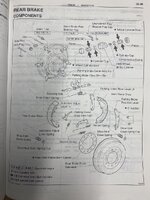Well, I do have to do a near insta-stop regularly to make sure my actual breaks don't seize. I haven't received official word on that, it's just me being paranoid about things that go unused for too long deteriorating.
If my car sits long enough without being driven the first few times the brake is applied doesn't sound good. Things start sounding normal once the corrosion wears off. Doesn't take long. I have had the emergency brake seize up when it gets applied by another driver. I never use the thing but young people these days are taught to apply it every time they park the car whether it's on a hill or on a flat. That's just dumb.
Cars haven't been fitted with an "emergency brake" since the 1920s, though the name has been widely (and incorrectly) used to describe the parking brake ever since.
To not apply the parking brake whenever you plan to leave the driver's seat for any reason is just dumb; It's generally possible to depend upon the transmission to prevent the vehicle from moving when in "Park", but that option only even applies to vehicles with an automatic transmission that has a "Park" setting, and doesn't exist in manual transmission vehicles or heavy automatics (heavy vehicles with automatic transmissions typically only have Drive, Neutral and Reverse).
And it's a basic principle of safety in general that you should always use multiple redundant and independent safety systems where these are available, so that failure of one doesn't result in damage, injury, or death.
Use of the parking brake reduces wear on the pawl that locks the transmission when in Park; And it also clears any corrosion or dirt from the parking brake mechanism, so it won't seize up.
The reason it seizes up on your vehicle when used is almost certainly that you don't use it regularly.
Young people these days generally get a much better education on how to drive than we oldies got. Of course, that doesn't mean it sticks, but then, forgetting what you were taught is at least no worse than not being taught in the first place, or worse, being taught something that's completely wrong (eg "You don't need to use the parking brake every time you leave your vehicle").

